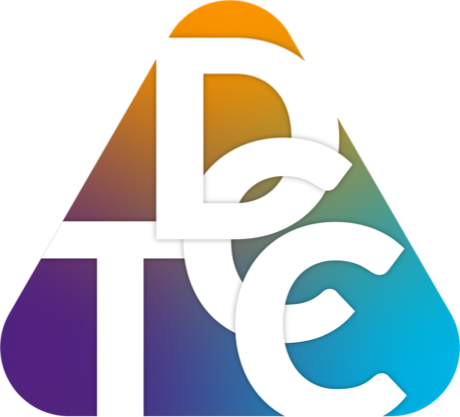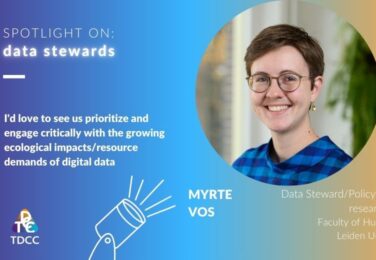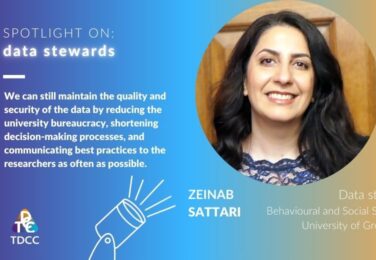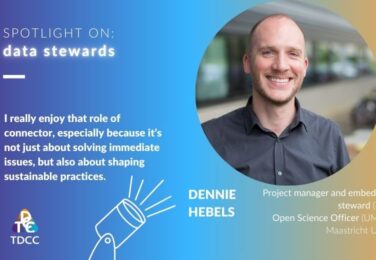
Spotlight on: Léa Massé
Every other week, the Thematic DCCs and the Data Steward Interest Group (DSIG) put the spotlight on one research data steward working in the Netherlands, to stimulate knowledge exchange and peer-to-peer learning.
What drew you towards the research data management field?
Before being appointed at the Department of Information and Computing Sciences, I worked as a researcher in Critical Criminology at the Erasmus University Rotterdam where I conducted research on the socio-biographical consequences of involvement in extremist movements. Due to the sensitive nature of my work, I became particularly interested in issues related to data privacy, data protection, data security, ethics and (sensitive) research data management during my research activities. Although I was not familiar with data stewardship when I came across the vacancy at the Department of Information and Computing Sciences, I felt strongly connected to the activities and tasks that the position involved and therefore decided to submit my application.
What is an activity/task of your role that you find yourself looking forward to?
I was recently invited to give several presentations about data management for PhD students at the department of Information and Computing Sciences, which is an activity that I particularly enjoyed. I believe that providing RDM trainings is a first step in raising awareness about the importance of data management, educating researchers about best RDM practices, and promoting a culture of data FAIRness. In the future, I would like to become more involved in data management trainings, for example by organizing workshops for researchers or data management courses for PhD candidates and students. In addition, I particularly like thinking with researchers about data management in the context of their specific research projects. Each project is unique, and because I come from a different disciplinary background (I was trained as a lawyer and a social scientist), I find it quite fascinating to hear about research conducted at the department of Information and Computing Sciences and to see what researchers are working on. This is a relatively new field for me, and it really stimulates my intellectual curiosity.
What is something unexpected that you can offer help with, if a colleague reaches out to you?
Having previously worked as a critical criminologist, I have acquired a quite extensive knowledge about research ethics, data privacy and data security, in particular in the context of research involving sensitive and confidential data; this has proved to be very useful in my current position. For example, I can help researchers preparing for their Ethical Board review or writing information letters for collecting personal data, and I sometimes brainstorm with them about potential ethical challenges or legal issues that they may encounter in their work and try to think about solutions with them. This is a part of my job which I find unexpectedly stimulating and fulfilling. My legal background and my experience as a researcher have also turned out to be unexpectedly useful for this position in that it has equipped me with the necessary skills to understand legal documents and translate policies and regulations into practice, and made me quite aware of the challenges that researchers sometimes face to comply with ethical, legal, and institutional requirements.
What do you think your community of research data professionals is missing?
At the moment there are limited advanced trainings for research data professionals in the Netherlands, which is not particularly surprising given that data stewardship is still in its infancy. Most skills I have acquired were learned ‘on the job’ or through my previous professional experience, and I sometimes feel that I miss some knowledge about aspects of research data management that could benefit me, such as how to manage software or create a database. Fortunately, I can always ask help from RDM colleagues, which has taught me a lot, but I think that offering advanced trainings could really help research stewards to further professionalize themselves and acquire more formalized skills. This could also contribute to the standardization of research data management knowledge and skills within and across universities.
What is a topic you would want to collaborate on with others?
One of the topics that really interests me at the moment is the legal and ethical aspects of research involving Artificial Intelligences; this is a topic which is still underdeveloped but which is becoming increasingly important with the rise of AI.
How would you like to see your current field of work evolve in the next 5 years?
Although there have been a lot of innovations and initiatives in research data management over the past years, we are still missing standardized data management practices. One of the results of this is that many faculties and institutions develop their own ‘how-to’ guidelines, and this sometimes leads to discrepancies in terms of research data management practices and requirements across institutions. I think that creating a national platform for best research data management practices could really help develop more standardized practices by bringing visibility to innovations in RDM, stimulate collaborations between universities as well as the exchange of RDM knowledge and tools..
Get in touch with Léa: Utrecht University staff page
Do you want to read other interviews published in the Spotlight on series? Visit the series' page.
Are you a data steward or data professional who wants to be featured in one of the future editions? Fill out this form.



